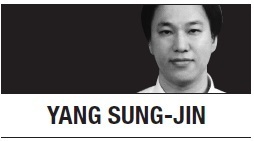When I came across friends on the street, they usually seemed surprised. Before they uttered a single word, I knew what they are trying to do. They wanted to say something nice without hurting my feelings, such as “You have changed,” but politely omitted details about the changes.
 Yes, I’ve been losing my hair fairly quickly in recent years, and the number of wrinkles on my face is also on the rise. Even I get surprised to see myself and notice a strange guy looking back in the mirror.
Yes, I’ve been losing my hair fairly quickly in recent years, and the number of wrinkles on my face is also on the rise. Even I get surprised to see myself and notice a strange guy looking back in the mirror.
But the hair-related and facial changes I’m going through as a middle-aged man working in the media industry are nothing compared with what’s happening in everyday and professional fields as a result of the Internet revolution.
One of those changes is the rise and fall of free tabloids in the subway. Only a few years ago, free newspapers were plentiful throughout the subway network in Seoul. There was even a horde of people who specialized in retrieving the free newspapers for recycling firms.
In recent days, however, it’s difficult to see passengers reading a free newspaper, thanks largely to the advent of smartphones ― the black hole of digital content.
Of course, print newspapers ― the very field in which I’m working full-time ― disappeared much earlier on the subway. The same fate hit print books, magazines and other things that used to hold space among people on the go.
Books, magazines and newspapers are not completely extinct in public transits, yet they have largely been sidelined. Smartphones and tablet computers are so pervasive in Seoul that I sometimes regard those reading print books on the subway with sincere admiration and boundless curiosity.
Back in the early 2000s, South Korea was witnessing the first wave of the Internet boom. After the country was hit hard by the Asian financial crisis in the late 1990s, policymakers and entrepreneurs shifted their attention to the potential of businesses based on mobile, broadband and Internet technology. A number of start-ups popped up. I was lucky to be a technology reporter then, in charge of covering companies armed with innovative ideas and cutting-edge solutions.
But many of the promising start-ups did not make it to the commercial market. Some of the pioneering technologies were too advanced to be received by mainstream consumers. Others were not mature enough to appeal to customers. Yet a small number of companies hit it big with their bold ideas and products, inspiring other venture businesspeople and college students willing to stake their fate on the digital revolution.
Strangely enough, Korea’s venture industry did not grow in the mid-2000s as fast as I expected. One of the reasons was that the old guards would not open up their territory in order to keep their profit-generating structure.
Samsung Electronics, for instance, was not so innovative, as far as mobile technologies were concerned. It introduced what it called “music phone,” a type of PDA (personal digital assistant) handset, and I quickly snapped it up.
But I was disappointed to discover that Samsung blocked access to free WiFi. If I wanted to use mobile Internet, I had to pay a hefty fee to wireless carriers. The electronics giant and wireless carriers already had innovative technologies, but decided to prevent users from using these solutions since such a “closed system” was seen as the best way to maximize profits.
Guess which company broke that WiFi cartel in Korea? Apple.
The first-generation iPhone allowed users to access free WiFi without paying a dime to their wireless carriers, a disruptive choice that alarmed existing carriers and handset makers, including Samsung. Now, access to WiFi is a default option on smartphones, but I think without the introduction of the iPhone here, such access would have been severely restricted.
Creating an open platform in which everybody and anybody can join and compete is crucial to accelerating digital business, even if such changes mean cutthroat competition that could disrupt and destroy existing businesses.
The Internet revolution, coupled with mobile devices, is only bound to speed up, eliminating old solutions and outdated businesses. Against this backdrop, big companies controlling critical infrastructure should rethink their strategies to stay ahead. Much bigger and more disruptive changes stemming from digital innovation will likely slam those who try to keep their vested interests.
By Yang Sung-jin
Yang Sung-jin is the digital content desk editor at The Korea Herald. He can be reached at insight@heraldcorp.com. ― Ed.
 Yes, I’ve been losing my hair fairly quickly in recent years, and the number of wrinkles on my face is also on the rise. Even I get surprised to see myself and notice a strange guy looking back in the mirror.
Yes, I’ve been losing my hair fairly quickly in recent years, and the number of wrinkles on my face is also on the rise. Even I get surprised to see myself and notice a strange guy looking back in the mirror. But the hair-related and facial changes I’m going through as a middle-aged man working in the media industry are nothing compared with what’s happening in everyday and professional fields as a result of the Internet revolution.
One of those changes is the rise and fall of free tabloids in the subway. Only a few years ago, free newspapers were plentiful throughout the subway network in Seoul. There was even a horde of people who specialized in retrieving the free newspapers for recycling firms.
In recent days, however, it’s difficult to see passengers reading a free newspaper, thanks largely to the advent of smartphones ― the black hole of digital content.
Of course, print newspapers ― the very field in which I’m working full-time ― disappeared much earlier on the subway. The same fate hit print books, magazines and other things that used to hold space among people on the go.
Books, magazines and newspapers are not completely extinct in public transits, yet they have largely been sidelined. Smartphones and tablet computers are so pervasive in Seoul that I sometimes regard those reading print books on the subway with sincere admiration and boundless curiosity.
Back in the early 2000s, South Korea was witnessing the first wave of the Internet boom. After the country was hit hard by the Asian financial crisis in the late 1990s, policymakers and entrepreneurs shifted their attention to the potential of businesses based on mobile, broadband and Internet technology. A number of start-ups popped up. I was lucky to be a technology reporter then, in charge of covering companies armed with innovative ideas and cutting-edge solutions.
But many of the promising start-ups did not make it to the commercial market. Some of the pioneering technologies were too advanced to be received by mainstream consumers. Others were not mature enough to appeal to customers. Yet a small number of companies hit it big with their bold ideas and products, inspiring other venture businesspeople and college students willing to stake their fate on the digital revolution.
Strangely enough, Korea’s venture industry did not grow in the mid-2000s as fast as I expected. One of the reasons was that the old guards would not open up their territory in order to keep their profit-generating structure.
Samsung Electronics, for instance, was not so innovative, as far as mobile technologies were concerned. It introduced what it called “music phone,” a type of PDA (personal digital assistant) handset, and I quickly snapped it up.
But I was disappointed to discover that Samsung blocked access to free WiFi. If I wanted to use mobile Internet, I had to pay a hefty fee to wireless carriers. The electronics giant and wireless carriers already had innovative technologies, but decided to prevent users from using these solutions since such a “closed system” was seen as the best way to maximize profits.
Guess which company broke that WiFi cartel in Korea? Apple.
The first-generation iPhone allowed users to access free WiFi without paying a dime to their wireless carriers, a disruptive choice that alarmed existing carriers and handset makers, including Samsung. Now, access to WiFi is a default option on smartphones, but I think without the introduction of the iPhone here, such access would have been severely restricted.
Creating an open platform in which everybody and anybody can join and compete is crucial to accelerating digital business, even if such changes mean cutthroat competition that could disrupt and destroy existing businesses.
The Internet revolution, coupled with mobile devices, is only bound to speed up, eliminating old solutions and outdated businesses. Against this backdrop, big companies controlling critical infrastructure should rethink their strategies to stay ahead. Much bigger and more disruptive changes stemming from digital innovation will likely slam those who try to keep their vested interests.
By Yang Sung-jin
Yang Sung-jin is the digital content desk editor at The Korea Herald. He can be reached at insight@heraldcorp.com. ― Ed.








![[Graphic News] More Koreans say they plan long-distance trips this year](http://res.heraldm.com/phpwas/restmb_idxmake.php?idx=644&simg=/content/image/2024/04/17/20240417050828_0.gif&u=)
![[KH Explains] Hyundai's full hybrid edge to pay off amid slow transition to pure EVs](http://res.heraldm.com/phpwas/restmb_idxmake.php?idx=644&simg=/content/image/2024/04/18/20240418050645_0.jpg&u=20240419100350)






![[From the Scene] Monks, Buddhists hail return of remains of Buddhas](http://res.heraldm.com/phpwas/restmb_idxmake.php?idx=652&simg=/content/image/2024/04/19/20240419050617_0.jpg&u=20240419175937)

![[KH Explains] Hyundai's full hybrid edge to pay off amid slow transition to pure EVs](http://res.heraldm.com/phpwas/restmb_idxmake.php?idx=652&simg=/content/image/2024/04/18/20240418050645_0.jpg&u=20240419100350)

![[Today’s K-pop] Illit drops debut single remix](http://res.heraldm.com/phpwas/restmb_idxmake.php?idx=642&simg=/content/image/2024/04/19/20240419050612_0.jpg&u=)